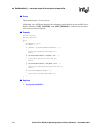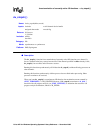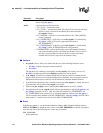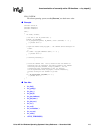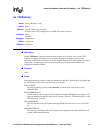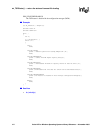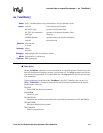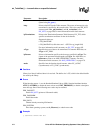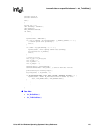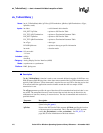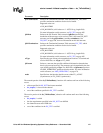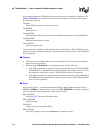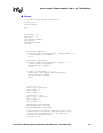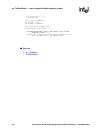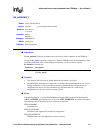
424 Voice API for Windows Operating Systems Library Reference
dx_TxIottData( ) — transmit data on a specified channel
!
!!
! Cautions
Library level data is buffered when it is received. The buffer size is 255, which is the default buffer
size used by the library.
!
!!
! Errors
IIf the function returns -1, use the Standard Runtime Library (SRL) Standard Attribute function
ATDV_LASTERR( ) to obtain the error code or use ATDV_ERRMSGP( ) to obtain a descriptive
error message. One of the following error codes may be returned:
EDX_BADIOTT
Invalid DX_IOTT (pointer to I/O transfer table)
EDX_BADPARM
Invalid data mode
EDX_BUSY
Channel already executing I/O function
EDX_SYSTEM
Error from operating system; use dx_fileerrno( ) to obtain error value
!
!!
! Example
// Synchronous transmit ADSI data
Parameter Description
chdev Specifies the valid channel device handle obtained when the channel was
opened using dx_open( ).
iottp Points to the I/O Transfer Table structure. The source of message(s) to be
transmitted is specified by this transfer table. This is the same DX_IOTT
structure used in dx_playiottdata( ) and dx_reciottdata( ). See
DX_IOTT, on page 509, for more information on this data structure.
lpTerminations Points to the Termination Parameter Table Structure, DV_TPT, which
specifies termination conditions for the device handle.
Supported values are:
• DX_MAXTIME
• DX_MAXDATA (valid values are 1 - 65535 for tp_length field)
For more information on this structure, see DV_TPT, on page 485.
wType Specifies the type of data to be transmitted. To transmit ADSI data, set
wType to DT_ADSI.
lpParams Points to information specific to the data type specified in wType. The
format of the parameter block depends on wType. For ADSI data, set
lpParams to point to an ADSI_XFERSTRUC structure. For more
information on this structure, see ADSI_XFERSTRUC, on page 478.
mode Specifies how the function should execute, either EV_ASYNC
(asynchronous) or EV_SYNC (synchronous).



